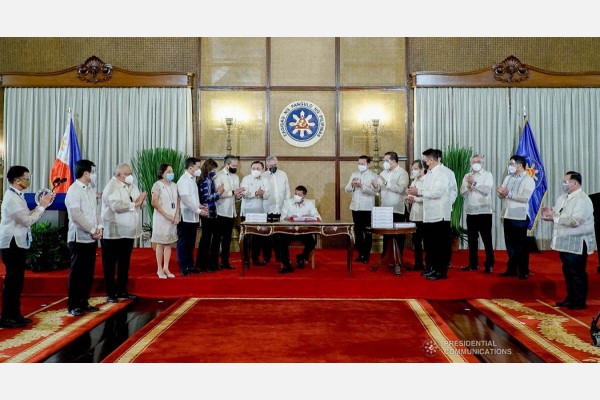Repository of Practices

Creation of the Department of Migrant Workers created under Republic Act No. 11641
Secondary GCM Objectives
Dates
Type of practice
Summary
Philippine President Rodrigo Roa Duterte signed into law the Republic Act (RA) No. 11641 creating the Department of Migrant Workers (DMW). A Transition Committee is mandated by the new law to facilitate the transition period until its operationalization. It is composed of the new Department’s Secretary together with officials from the offices and departments of Foreign Affairs, Labor, Maritime, and Social Welfare.
The law was created given the mandate of the State: to protect the rights and promote the welfare of overseas Filipino workers (OFWs) and their families; to make overseas employment a choice, not a necessity; to strengthen the domestic labor market for the effective reintegration of OFWs; and to progressively align programs and policies towards the fulfillment of the 23 Objectives of the GCM. This new Department shall cover all matters relating to OFWs, including prospective overseas workers in the Philippines and overseas workers who have returned and reintegrated back to the country.
The general functions of the DMW are: to protect the rights and promote the welfare of OFWs, regardless of status and of the means of entry into the country of destination; to formulate, plan, coordinate, promote, administer, and implement policies in relation to the overseas employment and reintegration; to undertake systems for regulating, managing, and monitoring the overseas employment and reintegration; and to empower and train them to gain appropriate skills and by ensuring access to continuous training and knowledge development.
Organizations
Main Implementing Organization(s)
Detailed Information
Partner/Donor Organizations
Benefit and Impact
As the law likewise defines ethical recruitment that enhances the protection of Filipino migrant workers, it complements the country’s campaign to reform the Kafala system, which has been the battle cry for migrant protection. The Philippines, as a country of origin, has been actively partnering with progressive countries of destination in the Middle East.
Thus, the DMW is created to specifically address the issues and concerns of Filipino migrant workers. It can serve as a single destination for OFWs in checking available overseas jobs, processing and issuance of overseas employment certificates, legal assistance for cases, repatriation, reintegration, and other necessary assistance.
It merges seven (7) existing offices with migration-relation related functions. Current services offered to migrant workers will also be served overseas with the new Migrant Workers Office which aims to be established in Philippine Embassies and Consulates. Thus, the creation of DMW will integrate all services offered by the merged agencies and provide cohesion to existing policies in pre-deployment, deployment, and reintegration. Important programs such as reintegration and training would also be given more attention.
In addition, there will now be a greater voice and representation of OFWs in the government – at the Cabinet level with a designated Secretary, and with presence at the local and provincial level.
Recommendations(if the practice is to be replicated)
Moreover, the Department of Foreign Affairs manages the OFW Help Facebook page, which is its direct line to Filipino migrants especially with the current travel and mobility restrictions when overseas Filipinos cannot go physically to the Embassies or Consulates. The page provides 24/7 assistance to distressed overseas Filipinos, particularly undocumented or irregular workers, and their next-of-kins by receiving their messages and referring their cases to the Philippine Embassy or Consulate near them. A department for migrants such as the DMW may have a similar online platform where it can be reached by clients from all over the world.
Innovation
Additional Resources
Date submitted:
Disclaimer: The content of this practice reflects the views of the implementers and does not necessarily reflect the views of the United Nations, the United Nations Network on Migration, and its members.
More Related Practices:
Peer Reviewer Feedback:
*References to Kosovo shall be understood to be in the context of United Nations Security Council resolution 1244 (1999).
Newsletter
Subscribe to our newsletter.